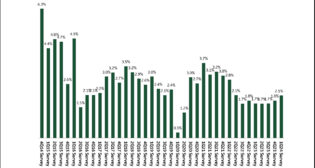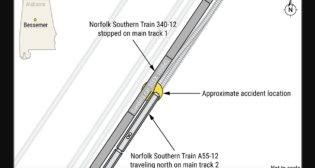
Trinity: “Significantly Improved” 3Q19 Results
Written by Andrew Corselli
“Trinity made meaningful progress in 2019 on the Company’s strategic and financial priorities in our first year as a rail-focused company,” said Melendy E. Lovett, SVP and Chief Financial Officer.
Trinity Industries, Inc. recently announced earnings results for the third quarter ended September 30, 2019, which include “significantly improved” year-over-year growth in revenue, operating profit and earnings per share.
Trinity’s quarterly total company revenue of $813.6 million reflects yearly growth of 34.1%, while quarterly earnings from continuing operations per common diluted share (EPS) of $0.39, an increase of 105% year-over-year.
“Trinity’s third quarter financial results significantly improved year-over-year due to the growth of our railcar lease fleet and increased deliveries of new railcars,” said Timothy R. Wallace, Trinity’s President and CEO. “The 34% increase in revenues and doubling of earnings per share reflects TrinityRail’s ability to improve our financial performance.”
“Demand continued at lower levels during the third quarter due to economic uncertainty associated with industrial production and global trade,” Wallace added. “These factors, combined with pressure on railcar loading volumes, are impacting railcar lease rates and utilization as well as orders for new railcars. Our management team has responded accordingly and is being highly selective in its originations of new railcar leases. The team has shifted a portion of new railcar production from 2019 into the first half of 2020 to facilitate the transition to lower railcar production next year.”
“Trinity is positioned to successfully navigate through shifts in market demand,” Wallace said. “We are highly experienced at both short- and long-term cycles and are prepared to respond to the needs of our customers. The recurring revenues associated with long-term leases in our railcar leasing business provide the company with a predictable level of steady cash flows. In addition, our management team has been highly focused on lowering Trinity’s cost of capital and streamlining our operating structure. We have made good progress in these areas, and there are various other initiatives underway that we expect to have a positive effect on the company’s performance in 2020.”
Other Trinity 3Q19 Highlights:
• Quarterly revenues from leasing and management services of $190.1 million with a 42% operating profit margin.
• Growth of the wholly and partially owned lease fleet to 102,090 units, bringing the total value of net property, plant and equipment for the lease fleet (before deferred profit) to $7.4 billion.
• Lease fleet utilization of 96.7% at quarter’s end.
• Rail Products Group quarterly revenues of $723 million and a 9% operating profit margin.
• Rail Products Group quarterly railcar orders and deliveries of 2,530 and 5,320, respectively, resulting in total railcar backlog of $2.4 billion at quarter’s end.
• Repurchases of approximately 5.2 million shares at a cost of $100.9 million.
• Successful execution of a $386.5 million secured railcar financing transaction with a blended coupon average of 2.98% subsequent to quarter’s end.
Cowen Insight
“Despite a challenging freight environment and ongoing PSR implementation by the railroads, TRN reported EPS of $0.39, beating our and consensus estimates of $0.33 and $0.35, respectively,” according to Cowen and Company analysts Jason H. Seidl (Managing Director and Railway Age Wall Street Contributing Editor), Matt Elkott and Adam Kramer. “The beat was partly aided by a higher volume of railcar sales than we expected, while the manufacturing segment deliveries of 5,320 units fell short of our estimate of 6,719 units, and its 9.0% margin was below the 9.9% we had built into our model. Orders of 2,530 units were also below our estimate of 3,700 units. The company removed 430 units from its backlog, noting a cancelation due to the financial condition of a Leasing customer, as well as a negotiated removal of railcars from the backlog in which TRN received compensation for terminating the agreement. The backlog at the end of 3Q19 stood at 19,950 units, compared to our estimate of 20,151 units.”
“The wholly owned and partially owned lease fleet grew 7.6% year-over-year to 102,090 units but declined very slightly from 102,140 units in 2Q19,” the analysts noted. “Utilization dropped by 110bps to 96.7%, from 97.8% in 2Q19. We note that lessor GATX also saw a sequential utilization decline, albeit less pronounced at just 30bps. All car types considered, average spot lease rates do not appear to have changed materially from 2Q19 levels. This is largely consistent with what GATX experienced. Admittedly, we find the Q/Q stability in market lease rates somewhat surprising in light of continued rail traffic declines and worsening railcar industry utilization.”
“TRN repurchased approximately 5.2 million shares at a cost of $100.9 million in the quarter, bringing YTD share repurchases to approximately 10.8 million shares at a cost of $233.9 million,” the analysts said. “As of Sept. 30, 2019, the company had a remaining authorization to repurchase up to $186.1 million, not to exceed 5.5 million shares, of its common stock under the current repurchase program.”



